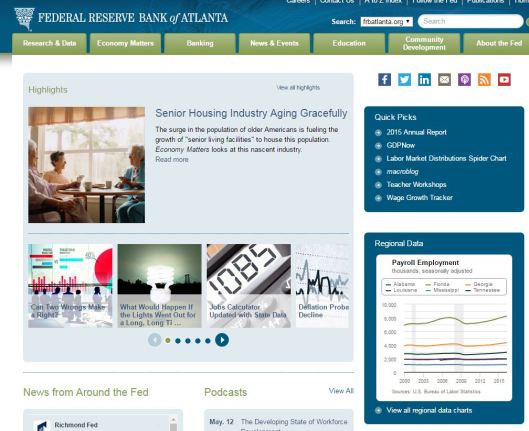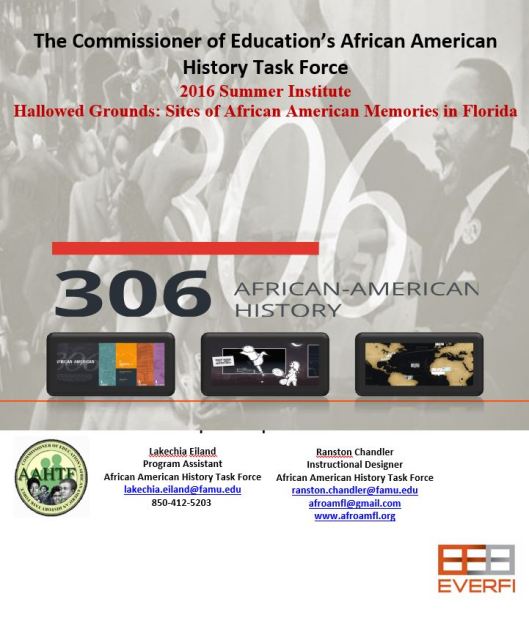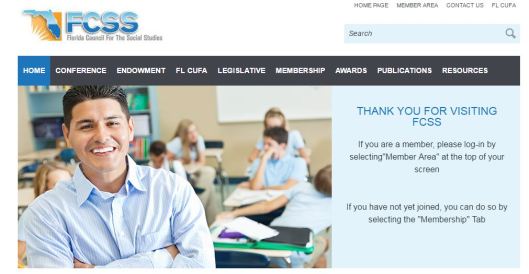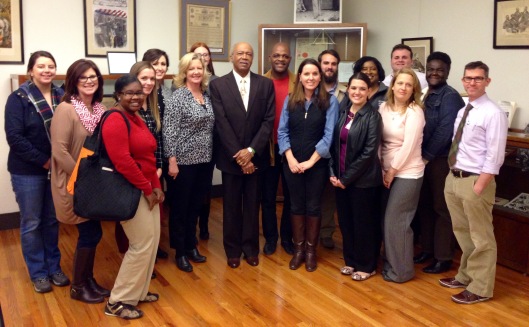So, we recently had a Lou Frey Institute/Florida Joint Center for Citizenship staff meeting here at our office. It was two days of planning for the future, led by our inestimable director, Dr. Doug Dobson, and it was refreshing to sit down with the entire Lou Frey Institute/FJCC staff to discuss issues and direction for the work that we do. I just wanted to take a moment and share with you, our friends in civic education here in Florida and nationally, just some what we have going on and where we are going organizationally. This is not an inclusive list; this is just what we are most excited about!
Projects with National Archives
We have have developed, over the past few years, an ongoing relationship with the fine folks at the National Archives. They have been kind enough to share personnel who were more than willing to come to Florida to work with our teachers on using primary sources. Happily, they will be working with us next month to develop bellringer/formative assessment or enrichment type resources that are aligned with high school US History and US Government benchmarks. This is new ground for us, as most of our focus has been on the middle school and (to a lesser degree) elementary school level. We are also hoping, sometime this summer, to work with the National Archives to develop additional elementary school resources centered around primary sources.
Adopting the SAMR Model
One of the biggest issues we face with our curriculum is that while we believe that we have quality resources, they follow a traditional model of classroom pedagogy. To address this, we are exploring ways in which we can adopt the SAMR model in our curricular revision and design.
We are definitely open to suggestions on this end, for sure. Right now, I will be meeting with the Educational Technology experts over at the UCF College of Education to explore possibilities. At the same time, we are striving to find a way to make our curricular materials more ESE and ESOL friendly. We have high hopes that we will bring you new and improved resources!
Website Redesign (Again!)
One of the most pressing needs across the state is for our teachers to be able to disseminate some of the great resources they themselves have created. We are working on a way to facilitate that. We hope to add an expansion to Florida Citizen that allows users to upload materials and share them with others. It will feature a ‘vetting’ system that will allow FJCC to recommend some of these materials as well. We have lots of hopes, and I expect that our great IT leader, Mike Barnhardt, will do some good things.
Civics Teaching Certificate
The Civics Teaching Certificate will provide pre-service teachers with complementary, civics teaching-focused coursework that will build on and enhance the Social Science Education B.S. curriculum. Individuals enrolled in the Civics Teaching certificate program will learn the substantive content, skills and pedagogical tools needed to deliver instruction explicitly linked to the 7th grade Civics End of Course Assessment (EOCA) in Florida. The Civics Teaching Certificate will also support and enhance high school U.S. government instruction. Reflecting the importance of service and experiential learning in civic education, enrollees will also take part in a summer internship that involves them in hands-on practice with local government.
Pre-service teachers enrolled in the Social Science Education B.S. major will complete four courses to develop expertise in civics content, pedagogy and assessment. The Civics Teaching Certificate will be completed as a three semester sequence. Summer coursework will include an internship in a local government office.
On the Drawing Board
We have a number of goals for the coming months. We would like to bring back some semblance of the Civic Mentor Teacher Program. We are working on a prototype, developed in house, of a three to five minute student oriented video on specific civics content, most likely around the election. This will, we believe, provide us an opportunity to see what we can affordably do with our own resources. If the video is received positively, we would love to develop more to supplement the already good teacher-oriented videos on the Florida Citizen site. We are also going to be starting work in Duval County with a couple of schools in need of assistance in Civics, and we are excited for this opportunity! Finally, we will continue to work closely with members of the Partnership for Civic Learning on newly identified civic education priorities in this state (a topic for another post!).
One of the hopes we have for the new year as well is to begin to develop more of a national presence. We will continue to work, as always, with the great teachers in Florida, and they will always be our target demographic, but we believe it is time to start partnering with other small civic-education organizations, perhaps in a version of the Civic Renewal Network that is oriented toward state level organizations, to see how we can improve civic education at the national level as well.
We all have ambitions, I suppose, and we do love what we do here. The Florida Joint Center for Citizenship remains committed to serving the needs of teachers, students, and the civic community in Florida, and we are always working to find new ways to do that. Thank you to our team and to those we have encountered both here and elsewhere for the work that you do in creating that next generation of citizens. And if YOU have ideas on how we can improve in our work, please let us know!










 Each section of the report dives deeper into each of the core competencies. No doubt, there will be some comments raised about the inclusion of ‘social justice’, knowing that that
Each section of the report dives deeper into each of the core competencies. No doubt, there will be some comments raised about the inclusion of ‘social justice’, knowing that that